Janice Hardy's Blog, page 97
September 6, 2018
Do You Know Who You Are? Building and Sharing Your Author Brand
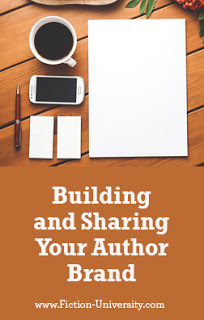 By Kris Bock, @Kris_Bock
By Kris Bock, @Kris_BockPart of the Indie Author Series
Walk through a grocery store. Chances are you can spot your favorite products from the colors
and style of the packaging. Drive down the highway. Does your stomach rumble when you see a familiar chain restaurant sign?
That’s successful branding.
Branding authors seems like more of a challenge, but the basic principle is the same. You want readers to have an instant reaction to your name and cover style. Authors can also take advantage of genre branding by matching the kinds of titles and covers a genre typically uses. For example, a muscular, bare-chested guy with a gun says “romantic suspense,” while a woman in a old-fashioned gown with a big skirt says “historical romance.”
Written by Janice Hardy. Fiction-University.com

Published on September 06, 2018 05:25
September 4, 2018
Practical Advice for Beginning Fiction Writers
 By George A Bernstein, @GeorgeBernstein
By George A Bernstein, @GeorgeBernsteinPart of the How They Do It Series
JH: As enjoyable as writing is, it can be tough for new writers to find their way. Please help me welcome George A. Bernstein to the lecture hall today, to share some practical advice on writing.
George A Bernstein is the retired President of a modest, publically held appliance manufacturer, now living in south Florida. He spent years attending writing seminars and conferences, learning to polish his work and developing a strong “voice.” He works with professional editors to ensure his novels meets his own rigorous standards, and all of his books are currently published by small indie press, GnD Publishing LLC, in which he has an interest.
White Death is the fourth of his Detective Al Warner Suspense series, with the others; Death’s Angel , Born to Die , and The Prom Dress Killer , all garnering rave reviews. Bernstein has become known for crafting endings no one expects. His fifth Warner novel is already in the works, to be published in 2019. Readers have likened Bernstein’s Detective Al Warner to Patterson’s Alex Cross.
Bernstein is also a “World-class” fly-fisherman, setting a baker’s dozen IGFA World Records, mostly on fly-rods, and he has published Toothy Critters Love Flies, the complete book on fly-fishing for pike & musky.
Website | Blog | Goodreads | Facebook | Twitter |
Take it away George...
Written by Janice Hardy. Fiction-University.com

Published on September 04, 2018 04:27
September 3, 2018
5 Common Problems With Middles
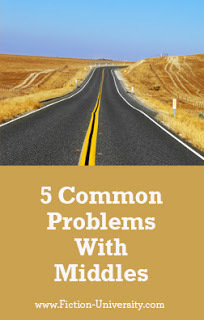 By Janice Hardy, @Janice_Hardy
By Janice Hardy, @Janice_Hardy The irony of working on Labor Day urged me to dig into the archives today, so before you head out to BBQ and visit friends and family, enjoy this look at common problems with a novel's middle.
The only thing tougher than a middle is an ending. Except for the maybe beginning.
For a long, long time in my early writing days, middles were the bane of my existence. I could start a story no problem, but once I got past the beginning, I narratively drove into the deep weeds. I don’t think there was a problem I didn’t run smack into when it came to middles--which is why I spent so much time figuring out how to make them work.
What makes middles so tough is that middles are where most of the plot happens. The protagonist tries and fails to resolve the story problem, the antagonist makes things harder and harder, the character arc unfolds, and all this stuff has to support whatever the beginning set up.
Written by Janice Hardy. Fiction-University.com

Published on September 03, 2018 03:00
September 2, 2018
Writing Prompt: The Skill Builder: Two Sides to Description
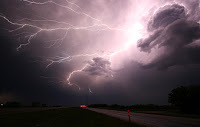 By Janice Hardy, @Janice_Hardy
By Janice Hardy, @Janice_HardyThis week’s prompt focuses on an exercise designed to work on a particular skill or technique, such as a POV exercise or character builder. Today’s skill: Description, with special emphasis on tone and mood.
Describe a storm from two perspectives—someone who loves it, and someone who fears it.
Write two paragraphs (under 150 words or so each) describing a storm. In the first, show it from the point of view of someone who enjoys storms and rain and gets pleasure or delight out of it, and reflect that mood in the words used. For the second paragraph, change the tone and mood to someone who’s afraid of the storm.
What else is going on in the snippet is up to you. It could be a couples’ first kiss in the rain or a child left alone at night. Use your imagination.
If you need some refreshers on tone and mood, try these articles:
How to Set Tone and Mood in Your Scenes How the Wrong Tone Can Change Your Whole Novel Get Your Head in the Game: How Character Moods Affect the SceneLeave a Message at the Tone: Setting the Right Tone for Your StoryPlaying With Personification Atmospheric Pressure: Employing The Four Seasons To Enhance Atmosphere Painting With Prose Written by Janice Hardy. Fiction-University.com

Published on September 02, 2018 05:22
September 1, 2018
Real Life Diagnostics: Is This Voice Interesting Enough?
 Critique By Janice Hardy, @Janice_Hardy
Critique By Janice Hardy, @Janice_HardyReal Life Diagnostics is a weekly column that studies a snippet of a work in progress for specific issues. Readers are encouraged to send in work with questions, and we diagnose it on the site. It’s part critique, part example, and designed to help the submitter as well as anyone else having a similar problem.
If you're interested in submitting to Real Life Diagnostics, please check out these guidelines.
Submissions currently in the queue: One
Please Note: As of today, RLD slots are booked through September 8.
This week’s question:
Is Sam’s voice interesting enough?
Market/Genre: Historical (mid-twentieth century)
On to the diagnosis…
Written by Janice Hardy. Fiction-University.com

Published on September 01, 2018 04:58
August 31, 2018
Writing a Good Scene
 By Jess Lourey and Shannon Baker
By Jess Lourey and Shannon BakerPart of the How They Do It Series
Jess Lourey and Shannon Baker here, making one of our favorite stops on our annual Double-Booked Blog Tour. We both started out as traditionally pubbed mystery writers and now, over 21 books into it, have branched out to magical realism, young adult, romance, thrillers, suspense, and even nonfiction, both traditional and indie.
Mercy’s Chase , the latest in Jess’ feminist thriller series that Lee Child calls “highly recommended,” is launching in a week and available for preorder now. Bitter Rain , the third installment in Shannon’s Kate Fox mystery series, is only days old and available now.
Be sure to read to the end to find out how you can win one of three copies of each! Now, on to the guts of this article: how to write a commercial fiction or genre fiction scene that will pick your reader up and sweep them away.
Written by Janice Hardy. Fiction-University.com

Published on August 31, 2018 05:52
Florida Heritage Book Festival Novel Workshop: How to Turn Your Idea Into a Novel
 By Janice Hardy, @Janice_Hardy
By Janice Hardy, @Janice_HardyJust a heads up for everyone who was interested in this full-day workshop. The registration link is now live. Just scroll down to the bottom under the writers conference schedule. It's the "Thursday Writers Workshop" for $80.
For those who really want a fun writers weekend in St. Augustine, my workshop is just the start of three great writing and book festival days. Here's the full lineup:
$235 Complete Package: 2-day Writers Conference, with lunches and Literary Legend Reception $180 2-Day Writers Conference (Thurs & Fri) with lunches $80 Thursday Writers Workshop, includes lunch (this is mine) $160 All Day Friday: Conference, luncheon, Legend Reception $105 ($120.00 at the door) Friday Writers Conference, includes Keynote luncheon $100 Friday Luncheon with Robert Macomber and Legend Reception $35 ($240 Table for 8) Friday Luncheon with Robert Macomber
Workshop Details: September 13: St. Augustine, FL
Thursday, September 13, 2018
10:00 a.m. to 4:00 p.m.
World Golf Village Renaissance
500 South Legacy Trail, St. Augustine
$80 (includes lunch & workbook)
Florida Heritage Book Festival Novel Workshop: How to Turn Your Idea Into a Novel
This day-long workshop is hosted by the Florida Heritage Book Festival.
Ideas hit us all the time, but we don't always know how to turn those ideas into a novel, or what's the best way for us to develop those ideas. In this workshop, you'll learn multiple ways to break down your idea and turn it into a solid plan for your novel. You'll work on exercises designed to help you:
Brainstorm your ideaFind your protagonist and antagonistCreate compelling charactersFind your core conflicts and use them to build your plotDevelop your settingDetermine the key turning points of the plotDiscover your themeFind the right structure for your writing process This hands-on workshop will guide you through the novel-planning process and help you find the plot and story within your idea. By the end of the day, you'll have a solid outline (or guide for those who don't like to outline) to your story.Written by Janice Hardy. Fiction-University.com

Published on August 31, 2018 05:20
August 30, 2018
Hey Indie Authors! Create Space is Closing Down.
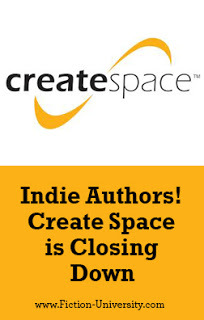 By Janice Hardy, @Janice_Hardy
By Janice Hardy, @Janice_Hardy Part of the Indie Author Series
If you’re an indie author, odds are you’ve already discovered this simply by logging into your Create Space account. But I spoke to some writer friends this week who were unaware this was happening, so I figured a quick shout out couldn’t hurt.
Amazon is closing Create Space and merging it into KDP (Kindle Direct Publishing). Amazon KDP has had the option to publish print books as well as ebooks for a while now, but with Create Space handling the print side of things, few authors seemed to use it (at least in my experience and conversations with authors). But that’s over now.
Amazon has made this entire process fairly painless. They have a nice “before, how to, after, and FAQ” section that will answer your questions and tell you what you need to do.
Written by Janice Hardy. Fiction-University.com

Published on August 30, 2018 06:06
August 29, 2018
Finding the Right Balance With Your Stage Directions
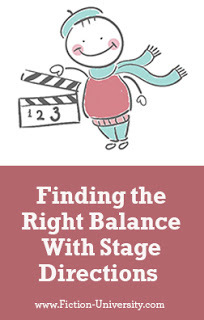 By Janice Hardy, @Janice_Hardy
By Janice Hardy, @Janice_HardyAwkward stage direction can turn an otherwise good scene into a clunky mess. But the right balance of action and character thought lets the reader sail on through.
No matter what type of novel you’re writing, at some point you’ll have to describe how the characters move about and interact with the world—the stage direction. Like the theater, you’re directing how your “actors” move on the stage (or the page in this case).
Sometimes the direction is basic, such as “she walked across the room.” Other times, it’s a complicated fight scene involving six guys and an eight-legged monster. Or it’s a show of emotion, such as when someone “curls into a ball and cries.”
Written by Janice Hardy. Fiction-University.com

Published on August 29, 2018 04:05
August 28, 2018
COMP LIT: Claiming Your Place on the Genre Shelf
 By Damon Suede, @DamonSuede
By Damon Suede, @DamonSuedePart of The How They Do It Series
One of the first thing any credible marketer will ask you is where your books fit. What are your comp titles and also-buys? As genre authors we write within a framework which we are constantly stretching and testing.
Even for authors working in the same genres and subgenres our books, our voices, and our fan bases often differ in wonderful (offtimes wacky) ways. Whatever their approach, all authors face the task of clarifying why their books are extraordinary. Attracting your unique readership starts with claiming your spot on the genre bookshelf: your niche.
Niche covers a wide spectrum of differentiators: subgenre, scale and setting, voice and vibe, heat/violence/suspense level, intensity, tropes, types, tone, and more. Some authors hunker down in a very narrow patch and never budge. Some folks wander the woods…peeing on trees all over the publishing forest, constantly marking out new turf for their fans. Essentially your niche is the stretch of the virtual bookshelf that your books fill perfectly and that your ideal audience and likely allies seek out instinctively.
Read more »Written by Janice Hardy. Fiction-University.com

Published on August 28, 2018 01:29



